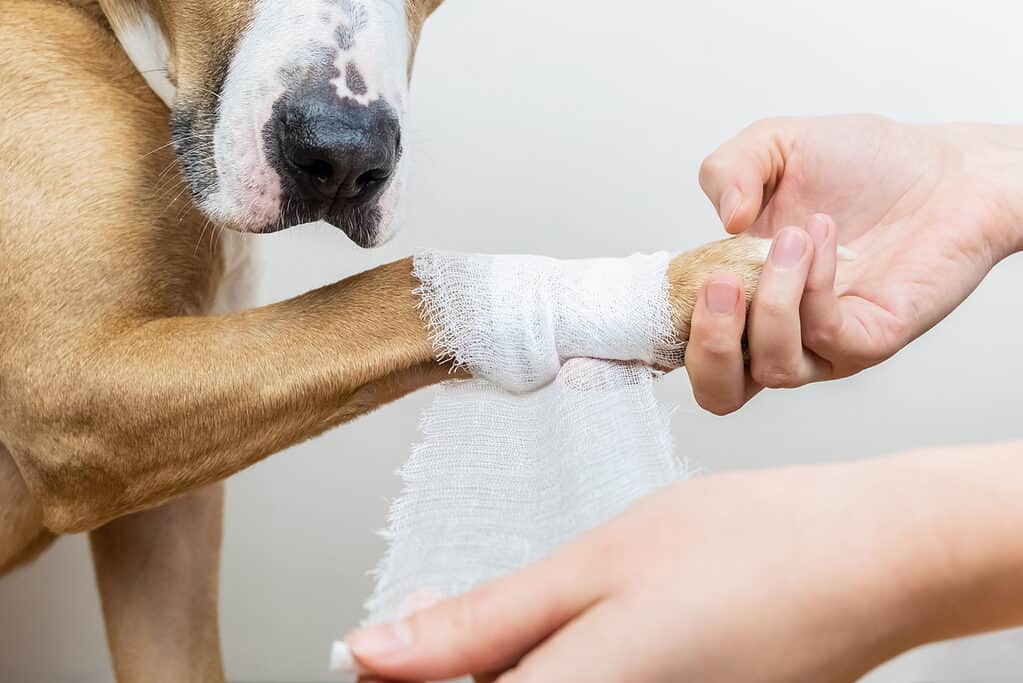Should you use hydrogen peroxide for dogs on their injuries?

Emmy award-winning veterinarian Dr. Jeff Werber confirms that hydrogen peroxide is safe for cleaning small wounds on your dog. However, he adds that there is no medically known benefit to using hydrogen peroxide for dogs instead of water and soap when cleaning out smaller, less-serious wounds.
Jenna Mahan, Director of Claims with Embrace Pet Insurance, also says to dilute hydrogen peroxide for dogs before use. “Hydrogen peroxide can be damaging to tissues and burn a little, so you may be better off using plain old saline, but if you do not have saline on hand, hydrogen peroxide can clean a wound quite well,” she says. Jennifer advises to dilute hydrogen peroxide for dogs with one-part water or one-part saline.
Tip 1: Wash Your Dog’s Feet
When you walk your dog or if they’re outside playing and having fun, they can step on all kinds of yucky debris. One of the ways to avoid a serious problem with their feet is by washing their paws, especially if they’re dirty or muddy from a recent walk.
You can wash them with a damp cloth, or you may want to place them in the bathtub to soak their paws thoroughly. With clean and healthy dog paws, your pet is less likely to develop an infection from a cut in the soft pads of the feet.
Will it Hurt a Dog to Lick Hydrogen Peroxide?
People sometimes use 3% hydrogen peroxide to induce vomiting in their dogs after they ingest harmful chemicals. But this procedure is typically done under the guidance and direction of a veterinarian. It’s best to avoid letting your dog lick or drink hydrogen peroxide, as it can cause inflammation and ulceration of the gastrointestinal tract. If you believe that your dog has ingested hydrogen peroxide, seek help from your vet’s office.

Cleaning wounds or your dog’s skin, in general, is an essential step for maintaining health and wellness. But you should take precautions with the products you use. Avoid using hydrogen peroxide, rubbing alcohol, soaps, shampoos, essential oils, or other products not specifically recommended by your vet. Some items can be toxic, slow healing, and cause irritations like rashes.
To keep your dog safe, you can use warm tap water to flush the wound. Or use a warm saline solution by mixing one teaspoon of salt with two cups of water. You should ensure there is no dirt or debris on the wound or surrounding fur and pat the area dry after gently washing with water or saline. You can also use an antimicrobial surgical soap, like chlorhexidine, to kill and prevent the growth of harmful bacteria. However, you should not use chlorhexidine on clean, healing wounds. It is generally safe to use on skin and other body surfaces, but you should still get an okay from your vet before using it on your dog or other pets.
Once the wound is clean and dry, use a small amount of antibiotic ointment and cover it with a clean bandage. This simple method is meant for minor cuts and scrapes. For serious injuries, take your dog to the emergency vet immediately and allow them to disinfect the laceration.
Can you use hydrogen peroxide on dogs?
Not totally! Unfortunately, while all of that good sounding stuff is happening, it is slowing down the body’s natural process to heal itself. When the peroxide is killing off the bacteria, it is also killing the very cells that your pet’s body is counting on to heal the wound.